Costly consequences: How DePaul President Robert Manuel’s strategy and leadership left UIndy in the red
May 22, 2023
More than a decade ago, Robert Manuel used a metaphor at his presidential inauguration ceremony at the University of Indianapolis (UIndy) to convey a vision for the future of the institution, then under his helm.
To a crowd of colleagues, politicians, faculty and others at Nicoson Hall on UIndy’s campus in Indianapolis, he quoted another who held the president’s seat before him.
“There’s a reason why our rearview mirrors are so much smaller than our windshields,” Manuel said.
When Manuel spoke to another group of new constituents nearly 10 years later, after it was announced that he would take over as DePaul’s president, the same metaphor would likely have resonated with a welcoming crowd inside DePaul’s Courtelyou Commons.
Much of DePaul faculty, staff and students only wanted to look forward. Few were shy of sharing their disaffection with Manuel’s predecessor, A. Gabriel Esteban. It was no secret that DePaul was struggling with revenue and enrollment. Desperate for a leader who would put the university in drive, the community embraced Manuel.
In May 2022, with so much excitement in DePaul’s own windshield, little focus was on the new president’s rearview, whose objects might have been more troubling than it first appeared.
Now, DePaul and its newest president are tasked with navigating itself through an historic budgetary crisis. But a closer look into the past of the man tasked with leading DePaul through this crisis reveals a decade of poor financial decisions, leadership described as “despotic” and a school in Indiana left in a crisis of its own.
Capital consequences in Indiana
Before coming to DePaul last spring, Manuel spent 10 years as the president of UIndy.
Manuel’s efforts and vision at UIndy appeared to center on physical growth and expansion. A drive through the school’s 50-acre campus today looks significantly different than it did when Manuel took over in 2013.
One of his earliest efforts, a $28-million, 160,000-square-foot health pavilion, broke ground in 2014. The construction progressed quickly, taking just 18 months to complete before opening the following year. The Keystone Group, a company that was awarded the contract and whose president and CEO, Ersal Ozdemir, sits on UIndy’s Board of Trustees, completed the project quickly.
A former UIndy administrator from Manuel’s tenure – who was granted anonymity for this story – said that the preliminary talks regarding the health pavilion were much less smooth than the building’s construction.
“His rationale was that he could make money by renting out the bottom floor to a local hospital and they would come in and rent the space,” they said. “He wanted to do this at a time when hospitals were cutting back and they were all axing their satellite facilities.”
Because of this, the source said that they, and other colleagues, advised Manuel against the project. Still, the president pushed it forward.
Whether it was the original plan or not, today, a fraction of the building is dedicated to clinical space. Most of the four-story building is comprised of university instructional rooms, departmental offices, meeting spaces, a cafeteria and an auditorium. One annex of the building’s first floor is currently dedicated to a non-instructional space with Indianapolis-based Community Health Network occupying an on-site health clinic.
A year after the health facility’s completion, another major project was well underway.
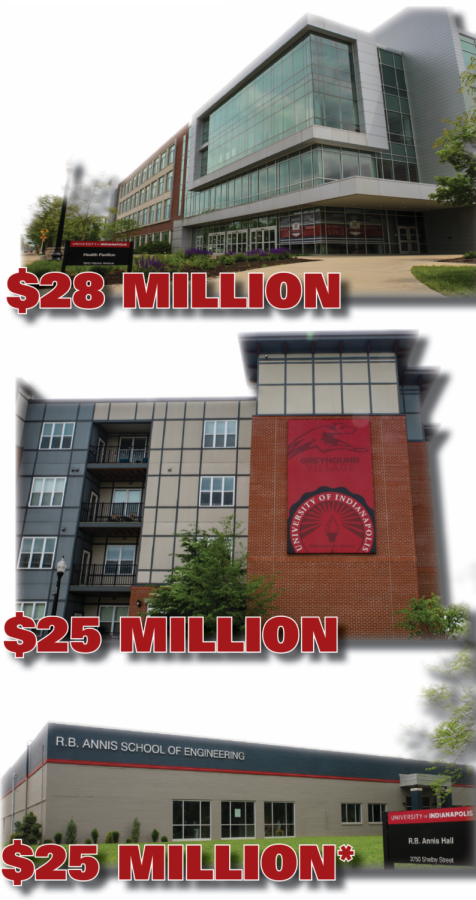
Greyhound Village, a new housing complex named after the school’s mascot, was built in 2016. The project cost $25 million and created space for 480 UIndy student residents. It is now one of 10 different student housing options at UIndy.
According to another former UIndy administrator also granted anonymity for this story, the project went forward despite advice from the president’s council that enrollment was diminishing and that they and others worried the new halls would not be filled.
“He made decisions to open these residence halls even though enrollment was shrinking… even though he was advised otherwise,” said the source. “He went ahead anyway and did it. There was no real collaboration with any cabinet members.”
In 2020, construction/renovation was underway for a new engineering building at UIndy. Exact costs of the project are unclear but the school called the endeavor a “culmination of the university’s $25 million investment in its engineering programs.”
While Manuel pursued this campaign of aggressive growth and expansion at UIndy, the country’s pool of eligible college students did the opposite.
According to the National Center for Education Statistics (NCES), the population of college students in the U.S. has been steadily shrinking since 2012, with nationwide enrollment decreasing by nearly 2 million in 11 years.
While UIndy reached peak enrollment in 2018, touting nearly 6,000 students, by 2019, the country’s decreasing enrollment phenomenon hit, as the school’s enrollment dropped to 5,935. NCES figures show that in the following year, UIndy’s enrollment fell to 5,801.
It is unclear whether UIndy did so to directly combat enrollment issues, but the university did increase its admission rates. In 2017, UIndy’s acceptance rate went from 82% to 86% the following year, and then to a reported 93% in 2019, according to NCES data. Even then, enrollment continued to fall, dropping by an additional 330 students from 2018 to 2021, despite the admissions rate adjustment.
The most recent NCES figures available show that the school’s enrollment sat at 5,325 in 2021, more than 600 fewer students than in 2018, a year after Greyhound Village opened. This enrollment total is the lowest of any year over the past decade and more than 100 less than UIndy’s total in 2013 – Manuel’s first year as the school’s president.
Desperate at DePaul
While Manuel served the second half of his presidency in Indianapolis, 165 miles north in Chicago, A. Gabriel Esteban sat in DePaul’s president’s office from 2017-2022.
Much of Esteban’s tenure in Chicago proved to be an era focused on fiscal growth and increasing profitability. During the Esteban administration, DePaul’s endowment grew immensely, from a reported $492 million in 2017 to almost $1 billion by 2021.
Though it was a period of financial growth, by the time Esteban’s tenure neared its end, a contentious relationship had grown between the former president and contingents of DePaul faculty.
“I certainly think the consensus was that we were emerging from a period of real struggle,” said Winifred Curran, DePaul Faculty Council member and professor in Liberal Arts and Social Sciences (LAS). “We …had a president [in Esteban] who was very unresponsive, who most people had not met.”
Due to this lack of shared governance, Curran said there was optimism that whoever was to be the next president would likely be an improvement.
“[There was] a feeling that it had to be better,” Curran said. “It was a very hopeful energy, I think.”
Since his announcement as DePaul’s 13th president on May 10, 2022, Manuel has appeared as a stark contrast early on to his predecessor in terms of making himself available to faculty, staff and students.
Curran said she and others felt optimistic after Manuel’s arrival upon learning he was aware of the current climate left between faculty and administration after Esteban’s exit.
“We felt he was responsive,” Curran said. “He was very aware of [2021’s] Council of the Whole and what had gone on, and recognized its importance. So, I think there was real hope that this was someone who sort of understood the problem.”
In September 2021, various stakeholders called a Council of the Whole with the intent of restoring shared governance to the budgeting process and encouraging necessary investment in the academic program. According to faculty sources, of the two budgets that had been negotiated by and agreed upon by the Strategic Resource Allocation Committee (SRAC), Esteban submitted only the more austere of the two to DePaul’s Board of Trustees, resulting in steeper cuts.
Faculty sources told The DePaulia that the period was one in which much of faculty had lost confidence in the president’s office as a committed partner in the shared governance processes established by the DePaul Faculty Handbook and university policies.
A year later, Manuel visited the first Faculty Council meeting of the 2022-23 academic year in September 2022 to discuss his vision and partake in conversations with faculty leadership.
During the meeting, multiple members of faculty expressed to the new president they felt “heartened” by his efforts to make faculty a part of the conversation. Before leaving, Manuel expressed an interest in attending other council meetings in the future. The president proved to keep his word, attending at least two of the next seven monthly meetings.
“I would say that [the September meeting] was probably the high point,” Curran said. “After that meeting, I didn’t hear anything negative from anyone. Everyone felt that he had done a great job. That he got it…And that he was willing to work with us.”
Fast forward to Spring 2023 and much of those feelings of good-faith collaboration have vanished.
Since DePaul’s $56.5 million budget gap became widely known on April 10, several members of faculty shared the opinion that Manuel, SRAC and the provost’s office withheld information regarding the gravity of DePaul’s financial situation. In doing so, some felt they were required to make pivotal decisions regarding personnel cuts with little time and only fractional information.
In March and April, college deans and faculty leaders at DePaul were forced to make decisions resulting in the nonrenewal of term faculty contracts, departmental cuts and more.
“We can’t make decisions like these on a dime,” Marcy Dinius, Faculty Council member and professor of English in LAS, told The DePaulia in April. “We’re supposed to try to make these kinds of decisions on a much longer timetable, and with much, much greater deliberation, and certainly with much more information than any of us had been given.”
In the same interview, Dinius said faculty originally “trusted we had a better partner in Manuel,” and added “All that trust has been replaced by very justified disappointment, frustration and resistance.”
A honeymoon ends
Throughout his tenure at UIndy, Manuel came across as well-liked to much of the public eye. He appeared at school sporting events and campus activities. Sources told The DePaulia that students generally saw him as engaging and fun.
Though their relationship would eventually tarnish, one former colleague of Manuel said that he was easy to be fond of early on.
“[There is a] honeymoon period with Rob,” said the former administrator. “He comes across as collaborative, jovial… then, about a year in, you find he’s not that way.”
Eventually, the former colleague left UIndy, and said they were far from the only one to depart, calling the staffing of administrative positions like vice presidents and deans a “revolving door” throughout the 2010s.
According to past snapshots of the UIndy.edu presidential cabinet page, through the first five years of Manuel’s presidency in Indianapolis, at least 22 different members filled the 13 different roles on the president’s cabinet.
The former colleague called the president’s leadership “despotic” and told The DePaulia their reason for leaving was due to an inability to support Manuel’s decisions. They said they often felt intense pressure from the president to show overt support for his vision and initiatives, even though the former staffer did not believe in them themself.
The staffer said that Manuel ignored the advice of colleagues that it was the wrong time to expand the college’s physical footprint and create new degree programs. The same source also said Manuel’s support for these initiatives often ended after their creation, when new residence halls struggled to fill and added programs withered.
“He is very fond of spending a lot of money and making big announcements but not supporting them afterwards,” the former administrator said. “Marketing and admissions would advise that there wasn’t [a] market for programs, but he would insist things be launched… Then would blame others for those departments not getting enrollment.”
Graphics by Jake Cox and Amber Stoutenborough
Another former UIndy administrator echoed this, stating that they too believed Manuel ignored the advice of counsel who expressed a belief that it was not the right time to expand with construction and new program development.
“He would get in his mind what he wanted to do, and it would be a unilateral decision,” the source said. “There was never really a discussion.”
Several UIndy sources The DePaulia spoke to for this story believe Manuel was adept at controlling what trustees knew concerning the school’s financials.
A current UIndy faculty member said that the president “had the wool pulled over the board’s eyes,” regarding expenses, the use of endowment funds and the reclassification of restricted donations. They also said when Manuel departed for DePaul, trustees “were left with a gaping wound that had to be fixed.”
According to correspondence acquired by The DePaulia under Indiana’s Access to Public Record Act (APRA), UIndy officials petitioned the state’s Attorney General’s office at least once since 2017 in hopes of reclassifying portions of the school’s restricted endowment funds.
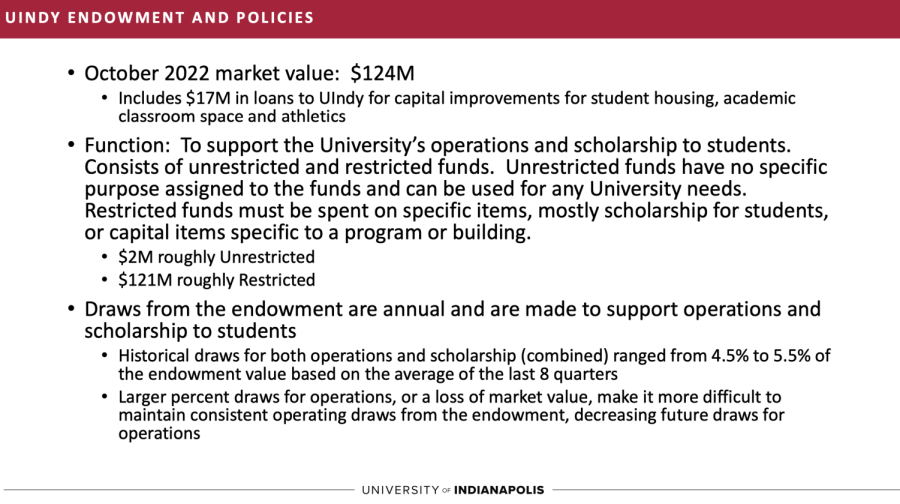
An email obtained by The DePaulia, sent to UIndy faculty on Feb. 22, 2023 from the president of the university’s faculty senate, Stephen Zimmerly, exhibits the degree of concern currently felt by UIndy’s Board of Trustees regarding the school’s financial outlook.
The communication details Zimmerly’s notes from an April trustees meeting, in which the university’s interim president and trustee, Phil Terry, presents a report to the body regarding UIndy’s financial outlook.
“President Terry described the Trustees as ‘having their hair on fire,’… All areas of the university are under scrutiny,” Zimmerly wrote to other members of faculty. “…The Trustees are taking steps to ensure they are not put in a position like this again… It’s all hands on deck, from the top to the bottom.”
Several attempts by The DePaulia to speak with UIndy trustees for this story went unanswered.
Like much of faculty’s recent concerns at DePaul, educators at UIndy criticized a lack of true, shared governance during Manuel’s presidency.
Multiple sources said that over the years, transparency from Manuel and his cabinet waned, until finally the president did not engage in collaboration with educators at UIndy, with one saying they felt he had a “contempt for the faculty.”
Indy in debt
Like DePaul, UIndy is a tuition-driven institution, with this revenue accounting for more than 65% of operating costs at the university. With a loss in enrollment, payment for these projects needed to be found elsewhere.
“[Manuel] borrowed from the endowment,” said the former administrator, first quoted in this story. “You never want to go borrowing from your endowment unless you have to. That’s a big deal. And he convinced the trustees that they’d get their money back in multiples.”
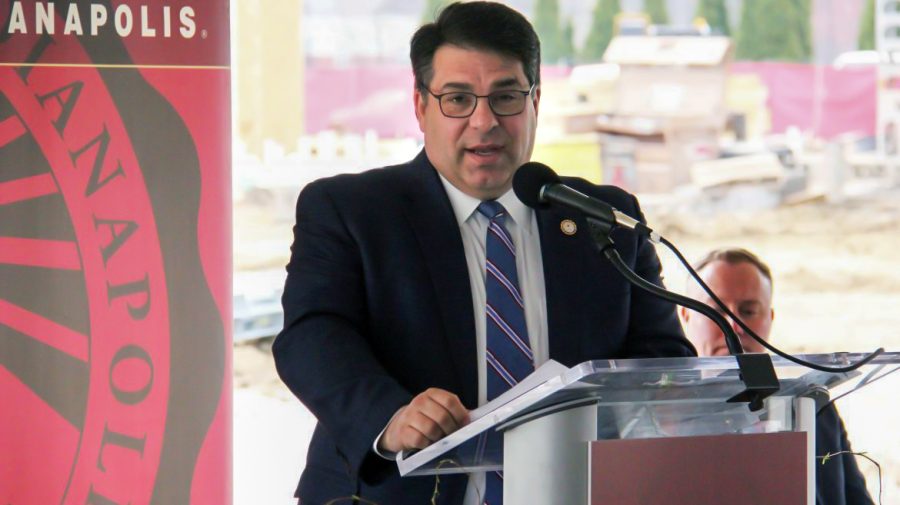
At least four times in Manuel’s tenure, UIndy borrowed from its endowment to help fund various development projects, according to figures published in annual independent audit reports and the school’s tax filings:
- In 2015, UIndy’s endowment was borrowed from twice. $4 million was loaned in June for housing investments, and a month later, $5.25 million was borrowed under three separate agreements to help fund “various capital projects.”
- In 2016, an additional $3.5 million was borrowed from the endowment for renovations. Four years later, more than $4.4 million was borrowed to pay for construction/renovation of UIndy’s new engineering building in July 2020.
Together, these borrowings add up to more than $17 million owed to UIndy’s endowment, which totaled $124 million in 2022. The most recent audit available from November 2022, conducted by Crowe LLP, an independent accounting firm, states that interest and principal payments for these loans are due in September 2023.
Materials leaked to The DePaulia shed further light on the state of UIndy’s endowment. Of the $124 million in funds, around $2 million is deemed unrestricted, according to minutes from a portion of the Faculty Senate meeting held in December 2022. Unrestricted funds have few rules on what these endowment funds may be used for, while restricted funds are regulated by those who donated the funds themselves.
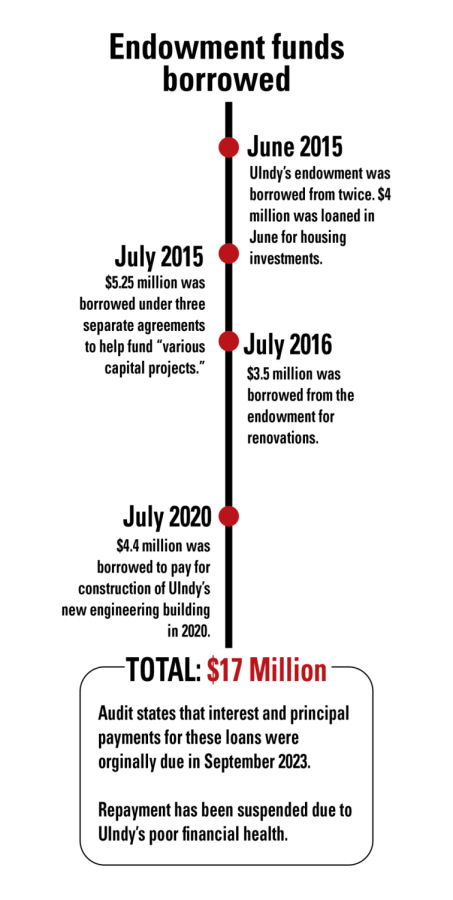
During the meeting, UIndy’s Chief Financial Officer (CFO) told attendees that all repayments to the $17 million owed to the endowment have been paused due to the school’s current financial state, according to the meeting’s minutes.
Robert Kelchen is a professor and head of the Department of Educational Leadership and Policy Studies at the University of Tennessee, Knoxville. Kelchen, whose area of expertise is higher education finance, said a pause like this is most likely an indication that UIndy’s finances are in a poor position.
“It’s not a great sign of financial health,” Kelchen said. “But also, I don’t know how common it actually is to be able to borrow that much out of an endowment.”
While it may not have worked for Manuel and UIndy, Kelchen said that, in some situations, investment can be a viable strategy for combating enrollment woes. It is unclear if this was the motivator behind Manuel’s initiatives to build, but Kelchen believes this type of approach can often be a gamble.
“As an investment strategy…I think there’s an added risk with these enrollment declines,” Kelchen said, adding that Midwest schools felt these population reductions more than some other regions in the U.S.
While UIndy has fought enrollment issues, one major development-related purchase – disclosed in a 2020 audit report – accounts for a major surge in UIndy’s debt and reads as follows:
“In August of 2019, the University executed an agreement for the purchase of the Health Pavilion for approximately $34.5 million through a mortgage loan and lease transaction with a third party that has a security interest in the facility.”
The purchase of the health pavilion, originally built in 2014, increased UIndy’s debt by 63% in a single year, jumping the school’s total from around $60 million in 2019 to $98 million by June 2020, according to an audit report from 2021. Since the school’s debt jumped in 2019, enrollment continued to fall, as UIndy lost more than 300 students from 2019 to 2022, per NCES.
The added liability and enrollment decline could be part of the reason why UIndy’s credit rating dropped to BBB in 2022 from BBB+ the year before according to a recent report by S&P, with the added note that the school’s “…weak available resource ratios expect to translate to weaker operations over time.”
Oftentimes, a drop in credit rating results in higher interest rates to debt.
In the December UIndy Faculty Senate meeting – the school’s governing body equivalent to DePaul’s Faculty Council – the school’s CFO said that the school is exploring lowering tuition costs to drive up enrollment, according to the minutes obtained by The DePaulia. Also in the meeting, the CFO said UIndy’s debt currently sits around $95 million, equaling a reduction of $1 million each year since 2020.
Based on The DePaulia’s analysis of UIndy’s most recent audit published for fiscal year 2021-2022, UIndy’s annual expenses total around $132 million.
Several days before this story’s publishing, The DePaulia contacted Manuel in hopes of receiving comments in response to some of the claims made by his former colleagues and faculty at UIndy for this story and received the following response:
“Thank you for the opportunity to reply. I’m unable to respond as I’m recovering from recent surgery and currently attending my daughter’s graduation. I will be able to respond when I’m back in the office on Tuesday, May 23,” Manuel wrote.
Social media posts showed Manuel at the commencement ceremony in Baltimore, Maryland on Saturday, May 20.
On the same day Manuel was in Baltimore, The DePaulia received an unprompted email from Chris Molloy, the former Vice President of Advancement at UIndy from 2013 through 2021. It is unclear how Molloy became aware of this story’s reporting, but the lengthy email came to Manuel’s defense.
“My experience working with President Manuel was very positive,” Molloy wrote. “He was very inclusive and transparent, and is a visionary, charismatic leader.”
Molloy wrote that Manuel changed new meeting structures to increase shared governance and raised considerable philanthropic funds for scholarships and other initiatives to support students and faculty at UIndy.
In contradiction to UIndy’s trending enrollment figures from the final four years of the Manuel era, Molloy believes the former president was successful in getting students on campus.
“At the same time [Manuel] was leading fundraising success, he was also leading admissions success,” wrote the former member of Manuel’s cabinet.
Every UIndy source spoken to for this story other than Molloy called the school’s current financial standing a “crisis.” While external factors like the Covid-19 pandemic and long-developing enrollment declines are major factors in the budget issues at UIndy, multiple sources told The DePaulia that the school’s current woes were exacerbated by Manuel’s strategies and decisions.
“Our budget crisis is a major crisis,” a current faculty member told The DePaulia. “It’s not like he came in and fixed things, he came in and made it a problem.”
Leading a ‘situation like the one he created’
Nearly a decade removed from his remarks and metaphors spoken to a welcoming crowd at his UIndy inauguration, Manuel once again donned academic regalia, this time, sporting royal blue and scarlet. On Nov. 11, 2022, to a mostly unfamiliar crowd at DePaul’s Holtschneider Performance Center, Manuel gave another inaugural address.
Though it is an excerpt from his speech that day in which he light-heartedly addressed the attendees he was indeed familiar with that – in hindsight – the DePaul community might find interesting.
“I have friends here from kindergarten, NYU, Georgetown, Allegheny and UIndy and it’s powerful to have you all here in one place… However, you’re not allowed to tell any pre-DePaul stories to anyone here at DePaul,” Manuel joked.
For many who worked with him at UIndy, Manuel’s “pre-DePaul” actions in Indianapolis are less than humorous.
“We feel very betrayed,” said a faculty member. “We feel hung out to dry… he ransacked our school and left.”
Upon learning of DePaul’s financial hardship, facing a budget gap of $56.5 million and ensuing cuts to faculty, staff and operations, one previously quoted former UIndy administrator found the circumstances to be ironic.
“It sounds like he landed in [a] situation just like the one he created,” they said. “And I don’t know that he’s equipped to handle it.”
The faculty source said they and many of their colleagues breathed an initial sigh of relief when they heard Manuel would be leaving UIndy for DePaul. But that relief soon turned to pity for his new constituency in Chicago.
“I think we just felt happy for us but then sorry for DePaul,” a current UIndy professor told The DePaulia.
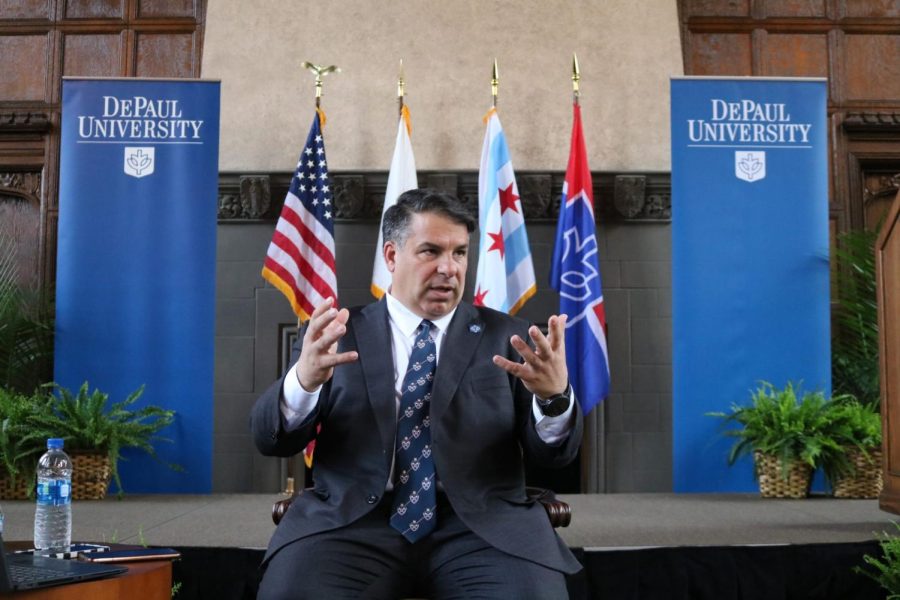
During the reporting for this story, The DePaulia contacted Judy Greffin, a DePaul Trustee and the chair of the presidential search committee that resulted in Manuel’s selection. The DePaulia hoped to speak with Greffin about the search committee’s interviews and vetting process of then candidate Manuel.
Greffin never responded to The DePaulia’s query, but on May 20, Citadel hedge fund executive and DePaul Board of Trustees chair Gerald A. Beeson sent a statement through DePaul’s media relations.
“After an extensive nationwide search, the Board of Trustees selected Robert Manuel to be our university’s 13th president because of his proven record of academic innovation and collaboration,” Beeson wrote.
Beeson also served on the search group, but the rest of the message does not address the committee’s process leading to Manuel’s selection. Instead, Beeson noted words of support for Manuel’s brief tenure thus far at DePaul.
“[Manuel] has worked diligently to build relationships across the university’s constituencies and strengthened shared governance at DePaul in the process,” Beeson wrote.
Now, UIndy begins a period of rebirth of its own, as the school announced in March that Tanuja Singh will take over as the school’s president on July 1. Since Manuel’s departure, UIndy Board of Trustees member Phil Terry has served as interim president.
Sources told The DePaulia that one silver lining resulting from the wake of the Manuel era in UIndy is an unprecedented period of transparency between all levels of university stakeholders, a stark contrast to the opaque nature of which they characterize his tenure. Multiple sources say that communication between the interim president, Faculty Senate and the Board of Trustees has been fluid and in good faith.
One UIndy source said that because of what had gone on behind closed doors under Manuel, even the board “reacted with full transparency,” knowing it was the only way to fix the “gaping wound” they were left with.
In Chicago, the future of DePaul faculty, trustees, administrators, students and staff now hangs upon the leadership of President Robert Manuel. Since April, DePaul has undergone cuts to full-time faculty and expects to see significant cuts to staff in June.
The budget gap has threatened academics too. The devastating cuts proposed to the library last month would have slashed nearly 50% of DePaul’s library resources if Manuel had not walked back the proposal after an uproar from faculty.
While Manuel did not create the situation at DePaul, it is his job to lead the school out of it.
One current UIndy faculty member shared with The DePaulia a message of advice for the DePaul community, in hopes that it does not soon find itself like UIndy, mending a “gaping” wound of its own.
“Watch your back, watch your purse strings…,” they said. “This is not someone that you can trust. It might seem like it, but it’s not true.”
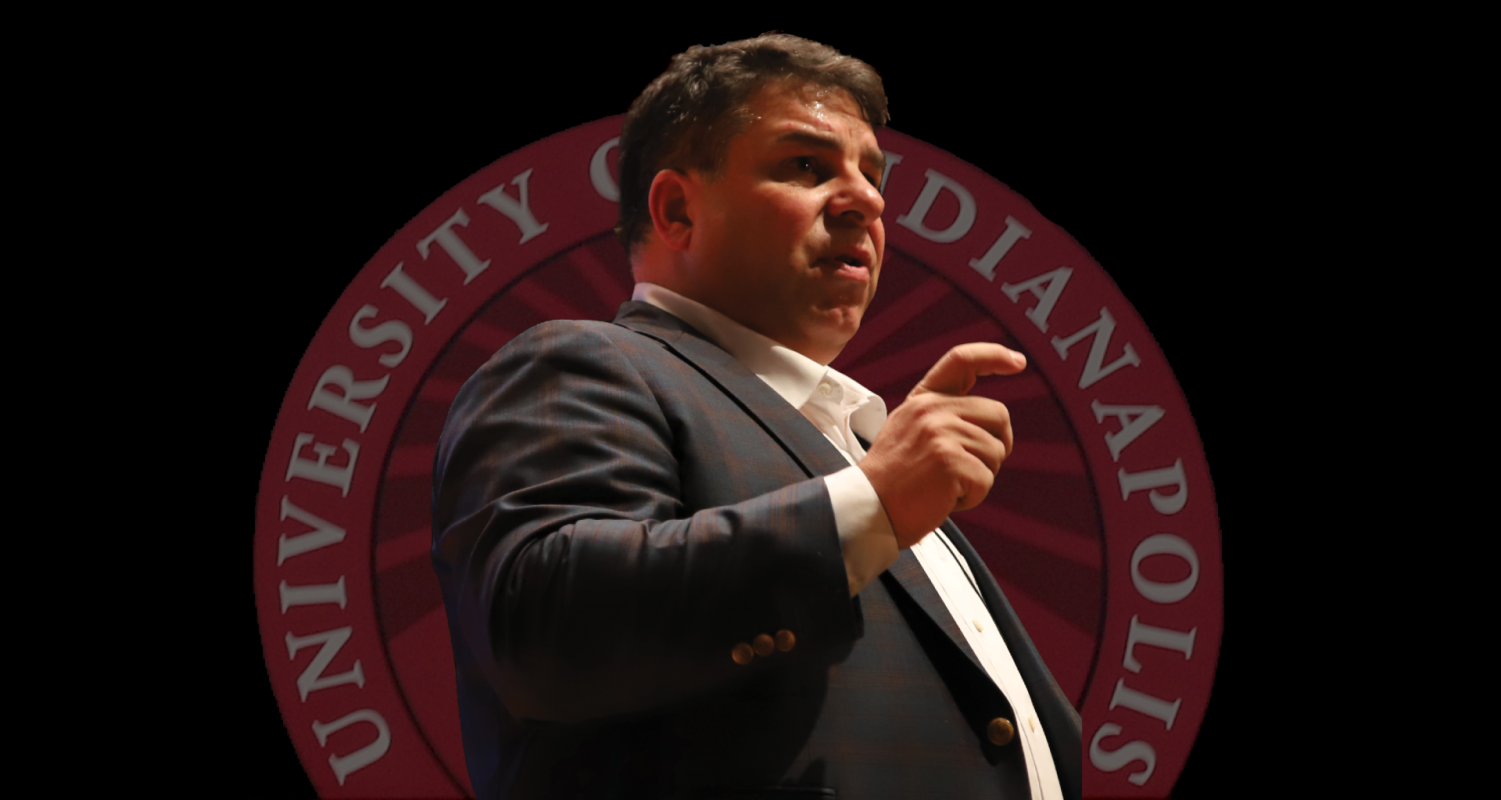
UIndy Alum ‘23 / Jun 13, 2023 at 4:06 pm
Hi! Recent grad of UIndy here from the class of 2023. It’s likely Rob won’t speak on the issue, or if he does, it’ll be short and he’ll do his best to just sweep it under the rug. Many issues people there had also were non-budget related and pertained to certain major issues being treated as small and kept out of the eyes of the public while changes were made quietly. All that to say, quadruple check EVERYTHING that may pass across his desk. Much love, good luck!
Staff / May 30, 2023 at 3:54 pm
Will the President be addressing the claims made here? I would really like him to.